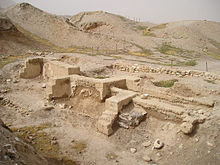
Levantine archaeology is the archaeological study of the Levant. It is also known as Syro-Palestinian archaeology or Palestinian archaeology[1][2] (particularly when the area of inquiry centers on ancient Palestine[3]). Besides its importance to the discipline of Biblical archaeology, the Levant is highly important when forming an understanding of the history of the earliest peoples of the Stone Age.[4]
Current archaeological digs in Israel are carried out by the Israel Antiquities Authority (IAA), and in the areas governed by the Palestinian Authority (PA), by its Ministry of Tourism and Antiquity, working under the auspices of the IAA. The Palestinian Authority prohibits unrestricted excavation at sites of archaeological importance. There are equivalent and similarly named authorities in Jordan and in Cyprus, a Directorate-General of Antiquities and Museums in Syria and a department of the Ministry of Culture and Tourism (Turkey).
- ^ Davis, 2004, p. 146.
- ^ Dever, 2001, p. 61.
- ^ On page 16 of his book, Rast notes that the term Palestine is commonly used by archaeologists in Jordan and Israel to refer to the region encompassed by modern-day Israel, Jordan and the West Bank. On page ix, he defines "ancient Palestine" the same way but also includes the Gaza Strip.
- ^ Rast, 1992, p. xi.
© MMXXIII Rich X Search. We shall prevail. All rights reserved. Rich X Search
